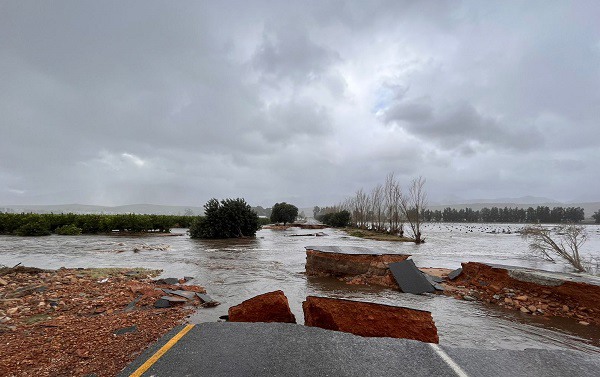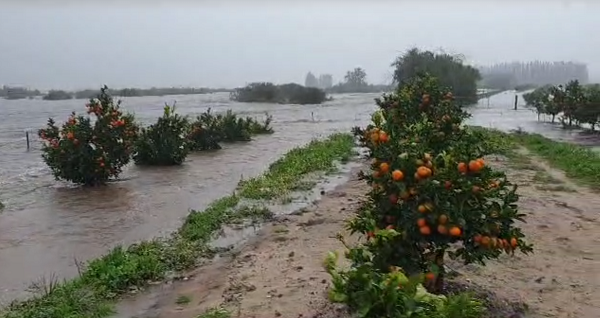A succession of cold fronts has caused severe flooding in the Western Cape and rain is expected until next week Wednesday, after which citrus growers will wait a further two or three days for orchards to dry out before harvesting can resume.
The port of Cape Town has closed with wind speeds of above 40 km/h expected over the weekend and into next week.
Stationary trucks queuing outside Worcester this morning
“Along the Berg River there is really a huge amount of damage to pump houses, vineyards/orchards, infrastructure and of course to informal settlements and industries,” says Eurica Scholtz of the Berg River Irrigation Board/Table Grape Producer Association. The area is a major table grape production region.
“We knew that there was a big frontal system underway but what we didn’t know, and what we weren’t warned about, is that the sluices of Wemmershoek Dam would be opened to a level 7 ahead of the rain.”
Opening the sluices on Tuesday as the rain started falling, greatly increased the volume of water rushing downstream in the Berg River to its highest level in 46 years, according to some farmers. Eurica says the association is currently warning Lower Berg River farmers that a massive amount of water is on its way either today or tomorrow as the water level in the upper Berg River area is dropping.
She adds that irrigation boards have for years called on the authorities not to manage dams at 100% during winter, especially when high rainfall is expected.
“Farmers along the Lower Berg River are busy removing pumps from pump houses along the river but it’s not a quick and easy undertaking and people’s lives can’t be placed at risk.”
She remarks: “We don’t yet know the extent of the damage to informal settlements, towns, industries as well as agriculture/farming. We are very worried about the residents of Mbekweni and other informal settlements at the moment as many of their houses are flooded, wet and very cold with subsequent damage to belongings.”
The Boland area’s wine and table grape vineyards could in some instances, if the water drains away come through unscathed, providing the infrastructure is not damage which is most unlikely.
"It is also in the midst the citrus packing period and some orchards cannot be reached due to the high water levels. If the root systems remains wet and under water for too long, Phytophthora root rot becomes a risk," she says.
There are reports of packhouses in the Hex River Valley under water and widespread damage to roads.
Citrusdal’s main entrance road washed away
The entrance road to Citrusdal has been washed away at the bridge crossing the Olifants River, which has breached its banks and is flowing through orchards along the banks. During the severe drought of six years ago the river basically stopped flowing.
When water levels have dropped, the public road will be repaired by the citrus growers of the area – this is the only entrance into town.

Fortuitously, growers didn’t have much stock to pack anyway because earlier rain had been keeping them out of the orchards: they are already behind on navels because of curtailed harvesting over the past two weeks. Meanwhile, mandarins are starting to ripen.
“We will run our last fruit over the line today, and that will go to a cold room until the road is open again,” says Okkie Burger, packhouse manager of Quattro Citrus in Citrusdal. “We’ll wait for the rain to pass and hopefully the road will be fixed by then.”
Post-rain bottleneck at port of Cape Town
“When the weather clears and everyone starts harvesting, there’s going to be a pretty big bottleneck. It’s going to be a challenge: you’ll have to get the fruit down to temperature as quickly as possible in cold stores at the harbour. There’ll be a bottleneck getting fruit on temperature before you can load out – especially on the navels with the new cold protocol,” he says.
 Citrus orchards under water: earlier this week the South African Weather Service had predicted disruptive rainfall over the western parts of the Western Cape
Citrus orchards under water: earlier this week the South African Weather Service had predicted disruptive rainfall over the western parts of the Western Cape
It just goes to show, he observes: you can plan everything on paper - and then the rain comes.
“Some of the older folks say it’s the heaviest downpour Citrusdal has had in thirty years. We need the rain – but we also need to get the fruit off and into a carton.”
A video of the Olifants River in flood taken this morning
The Western Cape Minister of Local Government, Environmental Affairs and Development Planning, Anton Bredell, said in a statement this morning: “We are also working closely with the South African Weather Services, which predicts more rain into next week. Dam and river levels, which are currently either at full capacity or overflowing, are being closely monitored through the Department of Water and Sanitation’s Dam Safety unit. We are confident in their ability to manage the water system to protect its integrity and minimize further flooding as best possible."
